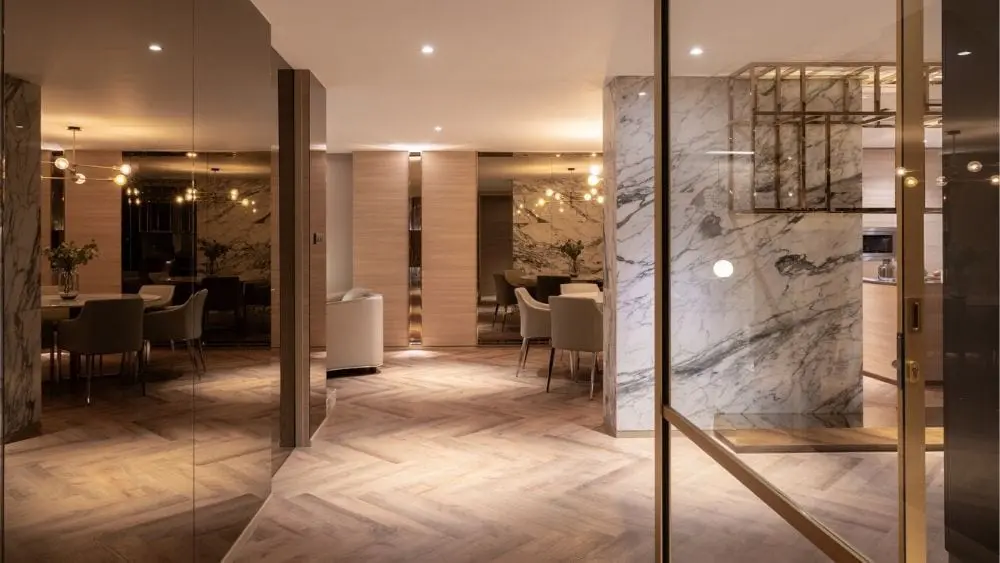
In the flooring world, carpeting is getting softer. Wood is getting more roughed-up. And vinyl is getting more luxurious.
Yes, you read that right. “Luxury vinyl” isn’t a contradiction in terms — it’s the phrase du jour among those who pay close attention to the materials home buyers are eager to walk on.
“It’s the fastest-growing portion of the industry in the past two years,” according to Scott Humphrey, chief executive of the World Floor Covering Association, a trade group based in Anaheim, Calif., which says this flooring category has developed thanks to extraordinary photo technology that mimics wood (or just about any other material) so closely that you have to look twice to see that it’s vinyl.
But luxury vinyl is far from the only flooring product that’s drawing consumer attention. Here’s the NewHomeSource guide to what’s hot underfoot:
Carpeting
It’s getting more environmentally friendly and a few manufacturers are creating fiber combinations that take softness to a whole new level, Humphrey says. “Everybody is making carpet that’s green. They have factories that do this all across the United States. Shaw (Floors) is the only one that recycles nylon into carpeting, but a lot of companies melt down polyester and make new fiber over and over.”
Humphrey, who grew up in a carpet-manufacturing family, says he regards the development of softer textures as the cutting-edge trend in the business. “The thing that has been most surprising to me is the return of luxury carpet. Some of it is the softest carpet I’ve ever felt.”
He particularly cites Shaw’s Caress line (nylon, with a new way of processing the fiber) and Mohawk Flooring’s SmartStrand Silk line (a nylon product that the company says uses three times the number of fibers of other carpet). Humphrey said the carpet industry was likely to follow suit.
In terms of carpet styles, the current favorite probably is a broad genre called cut-and-loop, in which the pile is partly cut and partly looped to create a sculpted look or pattern, he says.
“They’re ‘heathered’ and multi-tonal,” explains Amber Shay, vice president of the design studio for Standard Pacific Homes’ Denver operation, which works with homebuyers to choose the features and finishes of their new homes. “The trend is more toward the patterned carpet, with a cleaner finish, and some personality to it.”
Shay says Standard Pacific customers in her area (flooring preferences tend to vary by region) who favor carpeting tend to use it in bedrooms and on stairs.
Wood
With the advent of the “great room” concept that unites kitchen and family rooms into one expansive space, it’s become common to see hardwoods on kitchen floors, Shay says. “We’re almost always doing woods in kitchens. With the great room plan, having consistent flooring is a big part of that picture, having the space ‘roll.’ ”
A popular route to take with wood floors are the laminate versions, she says. “(Laminate) is a thin piece of wood on a core that’s made of something else. It creates structural stability, so you have less movement in the floor and it’s less expensive than solid hardwood.”
Preferences in hardwoods are leaning toward darker stains, with a growing interest in gray tones, she says. “The trends are also toward larger planks or toward using multiple-sized planks and toward more exotic species — hickory, cherry, walnut.”
Look for more wood floors that have been hand-scraped and hand-textured, Shay says. Humphrey concurs: “People are willing to pay for a new floor, but they want it to look old.”
And in a related (and greener) vein, a growing segment of the market is interested in reclaimed woods, which have been salvaged from older residential flooring or even from old barns. “Or, a lot of companies are taking new hardwood and making it look old,” Humphrey says. “It’s like what happened with blue jeans — making them look worn.”
Bamboo flooring made a big splash in the industry some years back because it comes from an easily renewable resource, but the category gradually met with some resistance because some early versions were known to have shrinkage issues. “Bamboo is getting better,” Humphrey says of the recent incarnations. “I haven’t heard much about the shrinkage issue in a couple of years.” Look for bamboo to be produced in an array of colors and plank widths.
Luxury Vinyl
The “luxury” angle may be a bit of a stretch, but technology unquestionably has given some vinyls a whole new look. At its most basic, the process of producing it amounts to taking a photo of wood and printing it into the significantly less expensive vinyl flooring, usually in the form of squares or planks.
“But anything you can take a picture of, you can make it into vinyl tile,” Humphrey says. “It can go into various rooms — some of it looks like marble and people put it in bathrooms.”
Tile
Ceramic tile is getting bigger — literally. Tile in formats larger than the standard 12-by-12 inches are growing in popularity, though there’s a lot of variation in regional preferences, Humphrey says.
“And those digital prints that you see on laminate countertops and vinyl tile — they’re also doing that on ceramic tile, so that you might also see tiles that look like hardwoods,” he says.
In the Denver area, Shay says the biggest trend is toward “modular” sizes — rectangular tiles or 12-by-24-inch sizes. “We’re seeing lots of tile that looks like a fabric, or like wood,” she said. “Some of them have a concrete kind of look.
 Windows That Cut Energy Costs, Protect and Defend
Windows That Cut Energy Costs, Protect and Defend